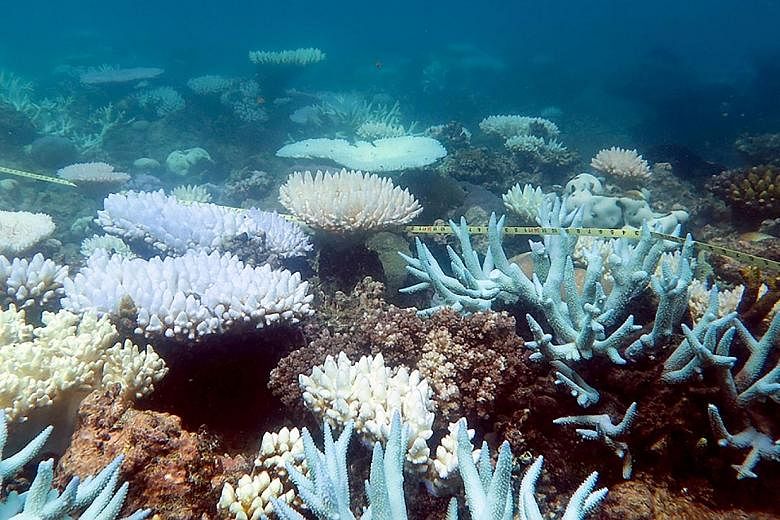SYDNEY • Two years after a long-lasting undersea heatwave scalded large sections of the Great Barrier Reef, scientists have now found that because so many corals died, much of the reef has likely been altered "forever".
"What we just experienced is one hell of a natural selection event," said Dr Terry Hughes, director of the Australian Research Council Centre of Excellence for Coral Reef Studies at James Cook University in Queensland.
In a notably blunt study in the journal Nature - laden with words like "unprecedented", "radical" and "catastrophic" - Dr Hughes and 15 colleagues report that in 2016 alone, about 30 per cent of the Great Barrier Reef's corals were lost, with the most severe damage in the isolated northern sector.
Many corals died faster than expected and at a lower level of sustained heat than had been predicted to be deadly.
The researchers add that since losses in certain species were much greater than in others, the entire ecological identity of much of the reef system has likely changed.
In particular, elaborate branching corals that provide key fish habitat are being replaced by bulky, less intricate "dome-shaped" corals, Dr Hughes said.
And because it takes about 10 years for even the fastest-growing corals to recover, the study warns that there is probably no reversing the sweeping change to the most damaged sectors of the world's largest barrier reef - not before another bleaching event occurs.
That certainly does not mean the end of the reef as a whole.
The south escaped much of the bleaching in 2016 and last year.
But it does mean that much of the reef will probably shift into a new ecological state with a less diverse, but more resilient, set of corals.
"The 2016 marine heatwave has triggered the initial phase of that transition on the northern, most-pristine region of the Great Barrier Reef, changing it forever as the intensity of global warming continues to escalate," reads the study, written by scientists from numerous Australian institutions, as well as the United States' National Oceanic and Atmospheric Administration.
In 2016 and last year, the Great Barrier Reef was pummelled by two successive summers in which ocean temperatures far exceeded normal for key portions of the reef - and stayed that way for a considerable period of time.
Extremely warm ocean temperatures stress corals and cause a phenomenon called bleaching, in which tiny algae called zooxanthellae abandon the corals they live with, causing the corals to lose their colour.
The consequence is not just outward. Zooxanthellae conduct photosynthesis necessary for the corals to survive.
If the algae are gone for too long, the corals die.
The new results, Dr Hughes said, show that roughly half of the corals along the 2,000km-long reef died in the past two years of bleaching.
The death toll amounts to about a billion corals, but there are another billion remaining.
"There's still a billion corals left, and they're breeding," Dr Hughes said. "The change in the mix of species is the story."
Coral reef expert Kim Cobb, who was not involved in the study, said "this paper is a grim post-mortem of an event that may very well mark the beginning of the end for many iconic reefs as we know them today, at least for the foreseeable future".
Dr Cobb, who witnessed a similar mass coral die-off at the Pacific island of Kiritimati in 2016, agreed that "these hardest-hit reefs will need decades to regain the level of diversity they embodied before 2016".
"This episode should remind us that there is no reason to expect that climate change impacts should be slow and steady and predictable," she wrote.
In another troubling finding from the latest report, corals proved much more vulnerable than expected to bleaching, succumbing at a lower combination of temperature extremes and heat duration than scientists had previously supposed.
"We were surprised to see about a 25 per cent loss of corals in the north that was more or less instantaneous," Dr Hughes said.
"That number of corals died in two weeks. They didn't die slowly of starvation, they actually cooked."
But the story going forward will be that of the remaining, less diverse corals and how they will likely come to dominate a changed ecosystem - and how that ecosystem, in turn, will likely be buffeted by future warming and bleaching events.
"The ones that are left are the really tough ones, which will probably inherit the earth," Dr Hughes said.
WASHINGTON POST

